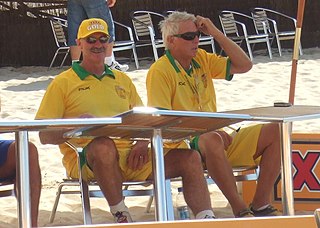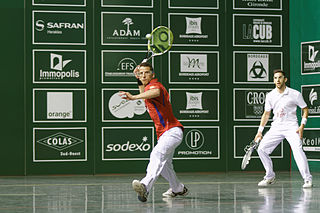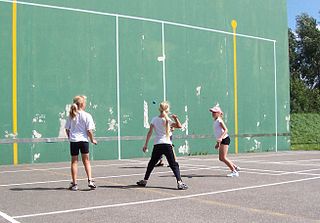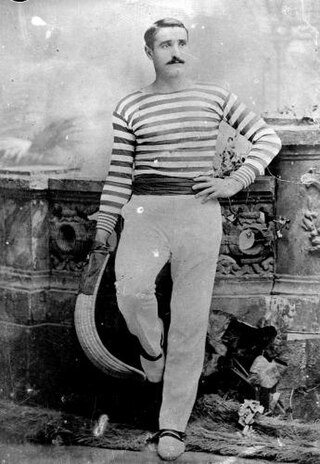A Basque pelota ball is a ball designed for the sport of Basque pelota, variations of the kind and size of balls are given by the peculiar category. [1]
Contents

A Basque pelota ball is a ball designed for the sport of Basque pelota, variations of the kind and size of balls are given by the peculiar category. [1]

Hand-pelota ball is traditionally made of a Buxus core, covered by several layers of Latex with a final layer of leather. [2]
A highly elastic rubber made ball is employed for speed games. The ball reaches a speed of 120 km/h in a typical service. [3] The fastest ever recorded throw of a pelota ball was 302 km/h, [4] about twice the speed of the fastest recorded pitch of a baseball.

Jai alai is a sport involving bouncing a ball off a walled-in space by accelerating it to high speeds with a hand-held wicker, commonly referred to as a cesta. It is a variation of Basque pelota. The term jai alai, coined by Serafin Baroja in 1875, is also often loosely applied to the fronton where matches take place. The game, whose name means "merry festival" in Basque, is called cesta-punta in the Basque Country. The sport is played worldwide, but especially in Spain, France, the U.S. state of Florida, and in various Latin American countries.
Fast bowling is one of two main approaches to bowling in the sport of cricket, the other being spin bowling. Practitioners of pace bowling are usually known as fast bowlers, quicks, or pacers. They can also be referred to as a seam bowler, a swing bowler or a fast bowler who can swing it to reflect the predominant characteristic of their deliveries. Strictly speaking, a pure swing bowler does not need to have a high degree of pace, though dedicated medium-pace swing bowlers are rarely seen at Test level in modern times. There are different categories in fast bowling known in international cricket such as fast bowling, medium fast bowling, medium bowling, etc.

Basque pelota is the name for a variety of court sports played with a ball using one's hand, a racket, a wooden bat or a basket, against a wall or, more traditionally, with two teams face to face separated by a line on the ground or a net. The roots of this class of games can be traced to the Greek and other ancient cultures.

Gaelic handball is a sport where players hit a ball with a hand or fist against a wall in such a way as to make a shot the opposition cannot return, and that may be played with two (singles) or four players (doubles). The sport, popular in Ireland, is similar to American handball, Welsh handball, fives, Basque pelota, Valencian frontó, and more remotely to racquetball or squash. It is one of the four Gaelic games organised by the Gaelic Athletic Association (GAA). GAA Handball, a subsidiary organisation of the GAA, governs and promotes the sport.

Jeffrey Robert Thomson is a former Australian cricketer. Known as "Thommo", he is one of the fastest bowlers in the history of cricket; he bowled a delivery with a speed of 160.6 km/h against the West Indies in Perth in 1975, which was the fastest recorded delivery at the time, and the fourth-fastest recorded delivery of all time. He was a part of the Australian squad which finished as runners-up at the 1975 Cricket World Cup.

The world record for a conventional wheeled passenger train is held by a modified French TGV high-speed code named V150, set in 2007 when it reached 574.8 km/h (357.2 mph) on a 140 km (87 mi) section of track. Japan's experimental maglev train L0 Series achieved 603 km/h (375 mph) on a 42.8 km (26.6 mi) magnetic levitation track in 2015.

Frontenis is a sport that is played in a 30 meter pelota court using racquets and rubber balls. It can be played in pairs or singles, but only pairs frontenis is played in international competitions. This sport was developed in Mexico around 1900, and is accredited as a Basque pelota speciality.

Spain first participated at the Olympic Games in 1900, and has sent athletes to compete in most Summer Olympic Games since 1920. Spain has also participated in every Winter Olympic Games since 1936. Its team is organised by the Spanish Olympic Committee created in 1924.

Basque rural sports, known as Deportes Rurales in Spanish or Herri Kirolak in Basque, is the term used for a number of sports competitions rooted in the traditional lifestyles of the Basque people. The term force basque is used in French.

Valencian pilota is a traditional handball sport played in the Valencian Community. Its origins are not known.

One-wall handball, also known as 1-wall, wallball or international fronton, is an indirect style of a ball game where the player hits a small rubber ball with their hand against a wall. The goal of the game is to score more points than the opponent. The player then hits the ball, and the ball bounces off the wall and the floor within court lines, if the opponent fails to return the ball, the player scores a point. The sport was created to bring together varieties, such as American handball, Basque pelota, Patball, Gaelic handball, Pêl-Law and Valencian frontó.

Albertín Aroldis Chapman de la Cruz is a Cuban-born American professional baseball relief pitcher for the Pittsburgh Pirates of Major League Baseball (MLB). He has previously played in MLB for the Cincinnati Reds, New York Yankees, Chicago Cubs, Kansas City Royals, and Texas Rangers and in the Cuban National Series for Holguín. Chapman bats and throws left-handed, and is nicknamed "the Cuban Missile", due to his high fastball velocity. A member of the 300 save club, Chapman is the all-time leader in strikeouts for left-handed relievers, and he is regarded as one of the greatest closers of all time.
This article lists the fastest record serve speeds for men's and women's professional tennis.

Indalecio León Zarasqueta Uriarte, known as Txikito de Eibar or Aizpiri txiki, was a Basque pelota player who participated in pala, Hand-pelota, remonte, long bat and short bat categories. Due to his physical characteristics he received the nickname of Txiquito, meaning in Euskera Little. Txiquito de Eibar was one of the first professional players of pelota at the time of its beginnings, in the 19th century.

A fronton is a two-walled or single-walled court used as a playing area for Basque pelota.

There is an abandoned Jai alai court in the back of the Hermanos Ameijeiras Hospital, the site of the old Casa de Beneficencia, on Calles Concordia and Lucenas near Calle Belascoain, an area that had been considered in the early part of the city as a place to locate the helpless and the unwanted, it was the edge of the city and the countryside known as the "basurero"; the spectator stands were parallel to Calle Concordia, the front wall of the court faced Calle Lucenas, east in the direction towards Old Havana. The original building has been annexed by five stories of residential concrete construction on the north side along Calle Virtudes. The Havana Jai alai fronton was known as "the palace of screams".

Mexico is scheduled to compete at the 2023 Pan American Games in Santiago, Chile from October 20 to November 5, 2023. This will be Mexico's 19th appearance at the Pan American Games, having competed at every Games since the inaugural edition in 1951.
The following is the qualification system and qualified countries for the Basque pelota at the 2023 Pan American Games competitions.
Filipe Otheguy is a French-born Brazilian basque pelota player. Son of a Frenchman and a Brazilian, he competed representing the Brazilian flag at the 2019 and 2023 Pan American Games.